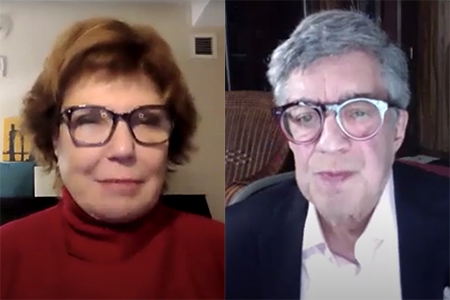Event Coverage Highlight

David A. Andelman Discusses Red Lines and the State of Global Diplomacy
 by Chad Bouchard
by Chad Bouchard
In his new book, OPC Past President David A. Andelman takes a detailed look at the diplomatic and military tactic of “red lines,” geopolitical ultimatums that he argues are now in greater use than any other moment in history.
On Jan. 8, Andelman joined Deborah Amos, international correspondent for NPR and Treasurer of the OPC, for an online discussion to discuss his new book, A Red Line in the Sand: Diplomacy, Strategy, and the History of Wars That Might Still Happen.
He said while some exceptional red lines have worked in the past, most are indefensible and destabilizing.
Amos asked about President Barack Obama’s red line in the use of chemical weapons in the Syrian Civil War, and whether declaring one had been a lost cause from the outset, or if it could have been handled well.
On Aug. 20, 2012, Obama used the term during a press conference when asked about Syria, saying a red line had been drawn if “we start seeing a whole bunch of chemical weapons moving around or being utilized.” On the one-year anniversary of that statement, hundreds of people died in a chemical weapons attack in Ghouta on the outskirts of Damascus.
Andelman said Obama’s red line was poorly conceived, given as an offhand remark he made during a press conference about the federal budget, without considering its consequences.
“The consequences in many respects were worse for other countries, for our allies. It was worse for the British prime minister [David Cameron], and it was certainly worse for the French president [François Hollande], who basically had his regime destroyed by everything that was going on around that. He was left high and dry after Obama decided he was going to pull out of this whole thing.”
Andelman cited some examples of red lines in history that worked well, including one established by French President Francois Mitterand in Chad in the 1980s to prevent Muammar Gaddafi from crossing south into sub-Saharan Africa, the line between North and South Korea, and the red line that NATO countries established to declare that an attack on one member country would amount to an attack on all members.
The “red line in the sand” in the title stems from two references that Andelman outlines in detail in the book. One is a Biblical account of a “line in the sand” said to be drawn by Jesus when a woman accused of adultery faced punishment by stoning, and he called for any of her accusers “who is without sin” to cast the first stone. The second reference comes from the at the Battle of Balaclava during the Crimean War in 1854, when a line of British soldiers repelled a Russian attack, which London Times correspondent William Howard Russell called a “thin red streak tipped with a line of steel.” The truncated term “thin red line” has since become common usage in diplomacy.
Amos asked whether President-elect Joseph Biden would get a “you’re-not-Trump bump” from adversaries of the U.S. and world leaders relieved about the end of the Trump administration. Andelman said he expects U.S. “red lines” would be tested in the near future.
“Ayatollah Khamnei in Iran has already done that in the last 48 hours, by saying this Capitol thing is an indication of how dysfunctional the United States is to begin with.”
He added that Iran is distracted by its battle with COVID-19, as indicated by the Jan. 3 anniversary of Qasem Soleimani’s assassination passing without a high degree of violence. He said the conclusion of his book centers on the effects of the pandemic on red lines around the world.
Andelman said he is most concerned about the way Iran might respond to the proliferation of Shia militias in Iraq, about China’s maneuvers in the South China Sea and growth of its so-called “string of pearls” naval bases surrounding the Indian Ocean, and relations between the U.S. and the Taliban in Afghanistan.
He said Khamnei recently boasted to Iranian press about a new missile battery in the Persian Gulf, causing Jake Sullivan, National Security Advisor-designate for President-elect Joe Biden’s administration, to express concern on CNN.
“Jake was saying that in fact they’re most concerned about missiles, and that the next round of talks has to not only involve reestablishing that red line of the Iranian nuclear deal, but also going a step further and looking at the missile issue,” he said. “I think there’s a third issue that they really have to look at, a third type of line, and that is just what is going to happen to these [Shia] militias in Iraq. I think those are potentially a tremendously destabilizing force in that whole region.”
Andelman’s book is available for purchase here: https://www.amazon.com/dp/1643136488/
Andelman’s podcast based on the book is available for free here: https://evergreenpodcasts.com/a-red-line-in-the-sand
Watch a playlist of video clips from the program via the window below.



